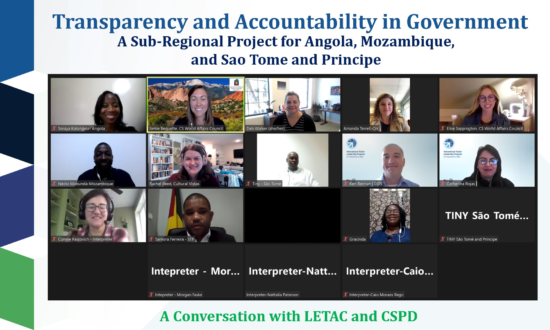By Elise Sapinton, Membership and Program Coordinator, Colorado Springs World Affairs Council

The IVLP group virtually met with the Colorado Springs Police Department (CSPD) and the newly formed Law Enforcement Transparency and Accountability Commission (LETAC). Photo provided by Colorado Springs World Affairs Council.
In the United States, 2021 was marked by the weight and tension of transparency and accountability within our country’s governing bodies. We heard the cries and felt the quakes of our nation over injustices in our governmental systems. Through one of our fall exchange projects, the Colorado Springs World Affairs Council had the opportunity to highlight the work being done on U.S. soil to promote transparency and accountability in those systems to international visitors.
Between late September and early October, we virtually hosted a delegation of public servant professionals from Angola, Mozambique, and Sao Tome and Principe. The meeting themes were centered around the topic of transparency and accountability in government, and the implementing National Program Agency was Cultural Vistas.
The group participated in an intergovernmental panel with El Paso County Commissioners’ Chairman Stan Vanderworf and James Thomas, Deputy Chief of Staff to Colorado Congressman Doug Lamborn, who spoke on the role and examples of ethics in U.S. local and federal government.
This same delegation also met with representatives from the Colorado Springs Police Department (CSPD) and the newly formed Law Enforcement Transparency and Accountability Commission (LETAC) to see a grassroots example of a municipal response to public outcry for accountability.
Research and Development Administrator for CSPD Amanda Terrell-Orr addressed police accountability measures and their relationship with LETAC. Terrell-Orr explained that meeting with the delegation inspired her to think beyond just the U.S. government and to more broadly and openly think about policing globally.
“It allowed me to think about things differently,” Terrell-Orr said. “I also was really interested in hearing what members of the delegation had to say about how [LETAC] information may work where they live and work. And hearing their questions and really understanding from their perspective what parts of what we discussed could be valuable to them to implement [was insightful].”
Terrell-Orr also expressed her gratitude for one delegate from Mozambique who, during the discussion, made the point of the importance of highlighting “what police are doing well” and the areas of improvement, rather than solely criticism.
“I think it was really valuable for me to have that experience and to be able to represent CSPD and the good efforts that we have made in our community,” Terrell-Orr said.
Deb Walker, a commissioner on LETAC, spoke with the delegates about her role and the triumphs and challenges of implementing the commission.
“I am a champion of ensuring that community voices are heard,” Walker said. “That those community voices who have been harmed by police are even preferred and make sure that the community understands how they can engage and advocate for themselves. That’s why this commission is so important. Because so many of the frustrations and problems that we face with transparency and accountability are being seen in law enforcement across the country.”
The meeting provided the delegation a window into the civil and structural challenges and successes of a grassroots commission born out of the powerful voices within a community that is heartbroken over injustice and advocating for its prevention. Delegates had the opportunity to ask questions that pertained to their governments and professions, and many shared the work being done in their countries along with the challenges they still face.
Terrell-Orr was struck by the number of individuals who spoke about police corruption and hoped that the delegates would take ideas from meeting with LETAC to see the possibility of restoration within their police departments and see their communities’ ability to create change.
“I hope that the delegation gained a sense of hope for a future in which police are good for public safety, that they behave professionally, that the community has a role in determining what their police department does, and how they do it in their community,” Terrell-Orr said.
Similarly, Walker expressed her hopes that the testimony of LETAC would inspire and empower the delegation to pursue change and accountability in their communities.
“Reciprocally, I hope that they were inspired to create some structural change,” Walker said. “We talked about how the creation of this commission emerged from the community, as a demand from the community to have some sort of accountability commission. I was delighted to see them process that because there is hope in that. Right? These communities can effect change. And that communities can hold power accountable.”
Walker’s final thoughts fully captured the purpose of the International Visitor Leadership Program and the exchange projects we host at the Colorado Springs World Affairs Council.
“I am a nerdy public servant type, and so are the people who participated in this,” Walker said. “You know, we’re all just trying to make our little corners of the world better, and that’s so inspiring.”
